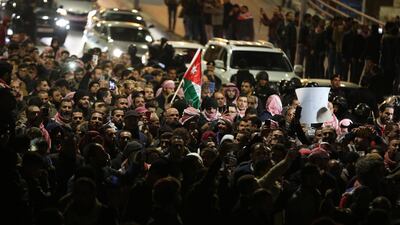A proposed royal pardon in Jordan has sparked a debate between lawmakers and the government over who should be given a second chance in the kingdom.
Jordanian lawmakers continued heated deliberations on Sunday over a general pardon drafted by the government on directives of King Abdullah designed to alleviate economic pressures on households that could see thousands of Jordanians released from prison.
The government says the pardon would waive thousands of traffic fines and benefit between 5,000 to 8,000 Jordanians in prison or awaiting trial. Critics however say the draft law is not wide enough and fails to include Jordanians in prison for debt and defaulted loans.
“This is the worst general pardon that has been issued in this country,” says Saleh Armouti, former head of the Jordan Bar Association and the member of parliament leading the push to amend the pardon. “Any pardon that leaves women, children and old men behind bars for financial crimes, debt or expression is not a true pardon and does not serve the interest of the people.”
The draft pardon, which the government provided to MPs last week for approval, includes 25 major exceptions covering 187 crimes deemed unpardonable such as terrorism, treason, murder, narcotics, and financial crimes such as tax evasion and abuse of public funds.
Yet unlike previous pardons, the draft amnesty also does not apply to civil lawsuits such as libel, slander, contract breaches, defaulted loans, bounced cheques and unpaid bills on goods and services such as hospital bills and university tuition.
Several hundred Jordanians are imprisoned and thousands are prosecuted each year for failing to repay loans or issuing bad cheques, activists say. Under the current pardon, plaintiffs – whether individuals, banks or corporations – must put forward a motion to drop charges in order for debtors to be released.
After months of speculation, King Abdullah instructed the government on December 13 to draft a general pardon to “alleviate the challenges and pressures facing citizens.”
In his directive, the King called for “giving citizens who have made mistakes and are going through difficult circumstances an opportunity to correct their course and behaviour.”
According to a statement by the royal court, the pardon aims to “contribute to alleviating the economic burden and difficult conditions citizens are going through.”
The move was met with praise and high expectations from ordinary Jordanians, and remains a hot topic on social media in Jordan. Yet hopes have been dampened since the government unveiled its draft pardon.
Jordanians from across the country filled parliament on Sunday holding court papers to demand MPs amend the pardon to include their relatives. Dozens demanded the king intervene to widen the amnesty.
Even protesters taking part in weekly protests over the economy and corruption were divided.
“I think the pardon issued by his majesty is a sign that people are listening to our demands and taking us seriously,” Mohammed, a 25-year-old unemployed university graduate said during a protest in Amman last Thursday. “All we need is for the government and parliament to live up to his majesty’s directives.”
“This isn’t a general pardon, it is a half-pardon,” said Majed Ghanem, a special education teacher from Jerash, in north Jordan. “There are a lot of Jordanian men and women in prison for bounced checks and unpaid bills who should be released.”
Parliament speaker Atef Tarawneh vowed on Sunday that parliament would not approve an amnesty before resolving the status of Jordanian debtors. Also on Sunday, dozens of MPs signed a memorandum to amend the pardon so that women, those under 18, and men aged 70 and above would be released regardless of their crime.
Lawmakers say they are likely to alter the pardon before sending it to the traditionally conservative king-appointed senate, which may reject an amended pardon, leaving the amnesty in a legislative deadlock.
__________
Read more:
Jordan denies entry for Syrian refugees trapped in Rukban camp
Jordan minister prompts Israeli protests after stepping on flag
Jordanians brave downpour to protest at corruption in Amman
__________
The pardon would mark the third issued by King Abdullah since his ascension to the throne in 1999. His first pardon issued weeks into his reign in 1999 benefited several thousand citizens; a second amnesty issued amid street protests and Arab Spring unrest in 2011 saw the release of 3,500 prisoners.
The move is aimed to lessen the burden on Jordanian households, who amid a near-record 18.6 per cent unemployment rate have seen government austerity measures scrap bread subsidies, raise taxes on fuel and commodities and lower the threshold for taxable income.

